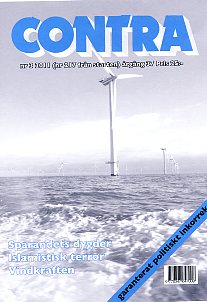
Islamist terror in Scandinavia
by C G Holm
Sweden and Scandinavia are not any more isolated from islamist terrorism. During the past years several attacks have been disclosed and stopped in the last moment. Taimour Abdulwahhab fortunately blew only himself up at Bryggargatan in downtown Stockholm last December. But it is only a question of time before someone will be ”succesful”. The article gives details on islamist attacks that were foiled in Sweden and Denmark.
The virtue of saving by Fredrik Runebert
Saving is a prerequisite for economic development and has been seen as a virtue since ancient times. The Roman rhetorician Marcus Tullius Cicero is presumed to have said: ”Man does not realize how big an income that saving really is”. Ingvar Körberg explains the philosophy of savings in a recent book on Savings Banks (Thrifts) and the development from small thrifts to today’s mega-banks that are ”too big to fail”.
Wind power is surviving on hidden subsidies
by C G Holm
When the German government more or less hit by panic this spring decided to close down German nuclear power plants in 2022, it will have severe effects on the German economy and the environment. A quarter of German elctricity is produced by nuclear power, and in Sweden the figure is 50 per cent. The closest method of producing elctricity is by coal-fired power stations, a proven technology, but extremely dirty. The second best opportunity is utilization of the new gas pipeline between Vyborg (Russia) and Greifswald (Germany) – two old Swedish towns from the 17th century when Sweden was a major European power. A rapid increase in gas deliveries from Russia is really what the Russians hope for. The country has lost its position as a superpower and has problems in keeping control over its neighbours Ukraine and Belarus. The Nordstream pipeline gives the Russians better possibilities to influence Western Europe, especially when they can disregard the policies of not only Ukraine and Belarus, but also Poland and the Baltic countries (the Nordstream pipeline, on the bottom of the Baltic, avoids all these countries).
Professor in history and activist for democracy
by Ann-Mari Lahti
Michail Suprun has researched on Polish and German prisoners in the Archangel area. In the archives there are 40 000 such prisoners listed and Suprun had made a database of 5 000. He was funded by the German Red Cross. In October 2009 he was arrested by the secret service FSB and his archives, his databses and computers were confiscated.
Lauri Törni fought for Finland and Vietnam
by Tommy Hansson
Lauri Törni was born in Vipuuri (Vyborg) in what was then Finland in 1919. Twenty years later the Winter War was fought in Finland when the Soviet Union attacked Finland. During the Winter War and later battles in the Second World War Lauri Törni became a legend. After the end of World War II Törni moved to the United States and became a US citizen under the name Larry A. Thorne. He turned into a heroic soldier in the Vietnam War, where he died in an accident.
Six feminist myths
In the latest issue of Contra we had an interview with Pär Ström. He told about his forthcoming book on six feminist myths. Now the book is published. True equality can only be based on truth, not on myths, Mr Ström states:
The myth of gender as a social matter
The myth of unequal pay
’The myth that women have harder to make a career
The myth that men hit women
The myth of double work
The myth on lower quality in health services
International trade does not promote democracy in Iran
by CArvin Khoshnood
The article is a summary of a scientific paper published in the journal Geografiska Notiser (#4 2010) written by Arvin Khoshnood. The article discusses the international trade of the Islamic Republic of Iran and the democratic development during the period 1980–2006. The author shows that the democratic development has been counteracted during the period, in spite of the increased trade. The reason being an unequal distribution of wealth, with an Iranian middle class, that has not beeen able to develop its potential.
New light on Swedish neutrality by David Stavenheim
Much has been said on Swedish remisisons towards Germany during World War II. Less has been said about the fact that during the later part of the war Sweden actively supported the allies. Former commander in chief Bengt Gustafsson has written a book on Soviet submarines in Swedish waters during the Cold War and in the book also discusses the shift in Swedish policies during World War II.

